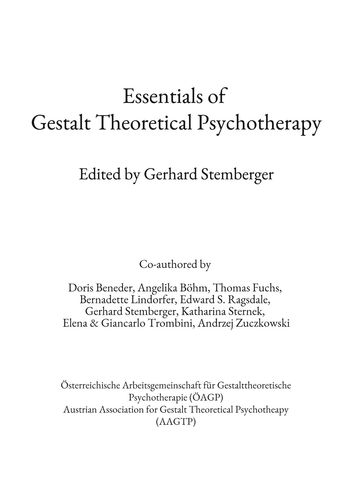GT & Psychotherapy
Essentials of
Gestalt Theoretical Psychotherapy
Edited by Gerhard Stemberger
Co-authored by
Doris Beneder
Angelika Böhm
Thomas Fuchs
Bernadette Lindorfer
Edward Ragsdale
Gerhard Stemberger
Katharina Sternek
Giancarlo & Elena Trombini
Andrzej Zuczkowski
184 pages; print edition: 14,00 Euro; E-Book 9,99 Euro
Contents, overview, and introduction
Info and ordering: in the BoD-Bookshop
***********************
From its very beginnings the specific holistic and phenomenological approach of Gestalt psychology, its insights and research results have made a deep impression on many people interested in mental health and in the clinical application of psychological insights. But this clinical field of application of the emerging new scientific approach of Gestalt theory was not the primary focus of the research work of the main founders of Gestalt theory (Max Wertheimer, Wolfgang Köhler, Kurt Koffka) and their students and cooperators in the first stage of the development of Gestalt theory. For various important reasons they had chosen perception as their primary field of research, then processes of thinking and problem solving.
In these early stages of the elaboration of Gestalt psychology it was their colleague Kurt Lewin who tackled the demanding task of applying this new line of thinking on a broader scope of human behavior, complemented by the work of Gestalt psychologist Adhemar Gelb and the holistic neurologist Kurt Goldstein on issues of the functioning of the organism as a whole. Since the focus of research and application of Gestalt theory - at least regarding the founders and main cooperators - in this first stage of development and advancement was not on clinical issues and applications those students and people interested in these specific fields werde more or less on their own to draw their conclusions and to find ways of applying the new insights in the clinical field. And indeed many of them did so: Several of the students and cooperators of the founders of Gestalt theory later on working in the clinical field found their own specific ways of applying Gestalt psychology in clinical psychology, psychopathology, and psychotherapy.
For example, Gestalt psychology deeply influenced the founders of group psychoanalysis Foulkes and Bion and further streams of group therapy, it left its mark on the thinking of numerous psychoanalysts, linked with the theory and practice of the individual psychologists in the tradition of Alfred Adler, entered into the psychopathological and perceptual-psychological foundations of HC Leuner's catathym-imaginative psychotherapy, and - perhaps most widely known - it deeply influenced Frederick and Laura Perls in the development of their psychotherapy approach, later on even called "Gestalt Therapy" loosely referring to the Gestalt psychological roots of their specific approach.
It is well known that Gestalt therapy as put forward by Fritz Perls et al. found a very critical and opposing reception by many representatives of academic Gestalt psychology. Rudolf Arnheim, Mary Henle, Solomon Asch and other Gestalt psychologists and scientists held the point that Gestalt therapy of Fritz Perls and others had nothing in common with Gestalt theory as put forward by Köhler, Koffka, Wertheimer, Lewin, Metzger et al. For example, Mary Henle wrote a quite thorough (and acerbic) article about 'Gestalt psychology and Gestalt therapy', published in the Journal of the History of the Behavioral Sciences 14 (1978). Though from a theoretical and scientific point of view one tends to share most of her particular points of critics Gestalt Theoretical Psychotherapy assumes that the overall judgement of the work of Perls et al. has to be more differentiated. One has to get over the first frustration (caused by his quite cruel distortions of Gestalt psychological terms and concepts in his somehow weak theoretical writings) and have a closer look on the creative way in which they implicitly implemented several Gestalt psychological findings and thinking in their practical work. Then it is possible to see some basic and important correspondencies of Gestalt therapy and Gestalt theory which may be useful and inspiring (see, e.g., the work of Georges Wollants, "Therapy of the Situation", which shows some possibilities of implementing Gestalt theory in Gestalt psychotherapy; for newer developments of Gestalt therapy on an international level see Gestalt News and Notes).
Less widely known, though not less important are applications of Gestalt theory in the clinical field by several of the students who were closer to the founders of Gestalt psychology and more educated and deeply rooted in Gestalt psychology (than e.g. Fritz Perls), like Abraham S. Luchins, Erwin Levy, J.F. Brown, M. Harrower and others. But their individual efforts and contributions in applying and advancing Gestalt psychology in the clinical field did not have the impact on the overall development of psychotherapy they would have deserved and still are hardly known in the psychotherapeutic community. And - since these pioneers were lacking the necessary backing of a network of cooperating people in the same field for several reasons - their efforts did not lead to a systematic elaboration of Gestalt psychology application in psychotherapy.
Hans-Jürgen P. Walter, a German Gestalt psychotherapist and student of Gestalt psychologist Friedrich Hoeth and influenced by Wolfgang Metzger, one of the most eminent representatives of German Gestalt psychology of the 'second generation' (visit the GESTALT ARCHIVE to read selected articles of Metzger in English), tackled the task of such a systematic elaboration in the 1970s in Germany, writing a first sketch of a genuine Gestalt theoretical concept of psychotherapy on the basis of the work of Wertheimer, Köhler, Koffka, Lewin, Metzger et al. and at the same time providing a basis for integrating concepts and experiences of other, compatible psychotherapy schools of thought. [See "Gestalttheorie und Psychotherapie" (Westdeutscher Verlag, 3rd ed., 1994; ISBN 3-531-12621-0. Click here for reviews in English)]. Within a group of Gestalt psychology educated psychotherapists, most of them from Germany and Austria, Walter's and his colleagues' work gave rise to the development of Gestalt Theoretical Psychotherapy, which is now a well established psychotherapeutic approach in the German speaking countries, first above all in Austria, where it has the status of a state-approved scientific psychotherapy method in its own right (besides psychoanalysis, behavior therapy, systemic therapy, integrative Gestalt therapy, Rogerian therapy, psychodrama therapy, and others).
English texts on Gestalt Theoretical Psychotherapy have been scarce for a long time: Walter's article 'Cognitive Behaviour Therapy And Gestalt-Theoretical Psychotherapy: A Comparison From the Aspect of 'Self-Determination'' was published in English in the E-journal GESTALT!. His article "What do Gestalt Therapy and Gestalt Theory Have to Do with Each Other?" was published in English in "The Gestalt Journal" (Spring 1999 issue, pp 45-68). A synopsis of H.-J. Walter's "12 characteristics of Gestalt oriented psychotherapeutical work" was published in Portuguese by M. Azevedo Fernandes: "Sobre a psicologia da forma e od 12 preceitos de H.-J. Walter".
See also the discussions on the Behavior Online Forum (BOL) on general and specific issues: GESTALT THEORY AND PROJECTIVE IDENTIFICATION (1996/1997) - with Thomas Fuchs et al.; GESTALT THERAPY AND GESTALT THEORY (1997) - with Gerhard Stemberger et al.; FIGURE/GROUND IN GESTALT THERAPY AND IN GESTALT PSYCHOLOGY (1998) - with Gerhard Stemberger et al.
An English article on basics of Gestalt Theoretical Psychotherapy and diagnosis by Gerhard Stemberger can be found in the book: Psychotherapeutic Diagnostic - Guidelines for the new standard (Vienna/New York: Springer 2008).
In 2021 a special issue of "Gestalt Theory - An International Multidisciplinary Journal" 43(1) has been published, presenting several article in English on essentials of Gestalt Theoreretical Psychotherapy:
Gerhard Stemberger (Vienna and Berlin):
Psychotherapy: The Challenge and Power of Consistency
Katharina Sternek (Vienna):
Critical Realism: The Epistemic Position of Gestalt Theoretical Psychotherapy
Bernadette Lindorfer (Vienna):
Personality Theory in Gestalt Theoretical Psychotherapy: Kurt Lewin’s Field Theory and his Theory of Systems in Tension Revisited
Gerhard Stemberger (Vienna and Berlin):
Ego and Self in Gestalt Theory
Angelika Böhm (Mistelbach and Vienna):
Basic Principles for Therapeutic Relationship and Practice in Gestalt Theoretical Psychotherapy
Thomas Fuchs (Bonn):
Gestalt Theoretical Psychotherapy – A Clinical Example
Giancarlo Trombini, Elena Trombini 8bologna), Gerhard Stemberger (Vienna and Berlin):
Reconciliation of Time Perspectives as a Criterion for Therapy Completion
Edward S. Ragsdale (New York):
Relational Determination in Interpersonal and Intrapsychic Experience
Since its beginnings in H.-J. Walter's book, the theory and practice of Gestalt-theoretical psychotherapy has been systematically developed, especially in Austria within the framework of the Austrian Association for Gestalt Theoretical Psychotherapy (Österreichische Arbeitsgemeinschaft für Gestalttheoretische Psychotherapie ÖAGP) and its journal "Phänomenal". This is evidenced by a large number of publications in the past decades, some of them also in English. After the focus issue of the international multidisciplinary journal "Gestalt Theory" on this topic, the anthology "Essentials of Gestalt Theoretical Psychotherapy", edited by Gerhard Stemberger, has now been published in 2022. It introduces the most important basic concepts of Gestalt theoretical psychotherapy in English:
**********************
Essentials of Gestalt Theoretical Psychotherapy
Edited by Gerhard Stemberger
Co-authored by
Doris Beneder
Angelika Böhm
Thomas Fuchs
Bernadette Lindorfer
Edward Ragsdale
Gerhard Stemberger
Katharina Sternek
Giancarlo & Elena Trombini
Andrzej Zuczkowski
184 pages; print edition: 14,00 Euro; E-Book 9,99 Euro
Contents, overview, and introduction
Info and ordering: in the BoD-Bookshop





